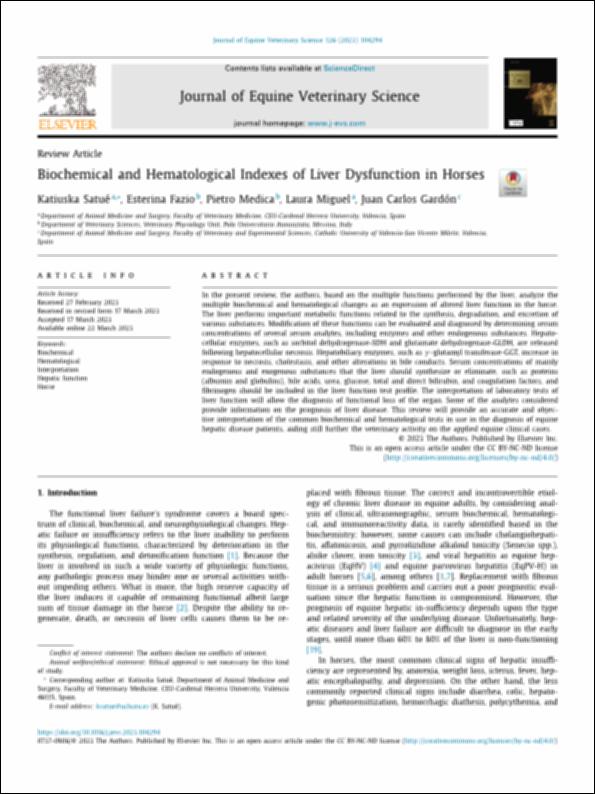Please use this identifier to cite or link to this item:
http://hdl.handle.net/10637/15268Biochemical and hematological indexes of liver dysfunction in horses
| Title: | Biochemical and hematological indexes of liver dysfunction in horses |
| Authors : | Satué Ambrojo, Katiuska Fazio, Esterina Medica, Pietro Miguel Pastor, Laura Gardón, Juan Carlos |
| Keywords: | Caballos; Horses; Enfermedad animal; Animal diseases; Bioquímica; Biochemistry; Hematología; Hematology; Hígado; Liver |
| Publisher: | Elsevier |
| Citation: | Satué, K., Fazio, E., Medica, P., Miguel, L. & Gardón, J.C. (2023). Biochemical and hematological indexes of liver dysfunction in horses. Journal of Equine Veterinary Science, vol. 126 (jul.), art. 104294. DOI: https://doi.org/10.1016/j.jevs.2023.104294 |
| Abstract: | In the present review, the authors, based on the multiple functions performed by the liver, analyze the multiple biochemical and hematological changes as an expression of altered liver function in the horse. The liver performs important metabolic functions related to the synthesis, degradation, and excretion of various substances. Modification of these functions can be evaluated and diagnosed by determining serum concentrations of several serum analytes, including enzymes and other endogenous substances. Hepatocellular enzymes, such as sorbitol dehydrogenase-SDH and glutamate dehydrogenase-GLDH, are released following hepatocellular necrosis. Hepatobiliary enzymes, such as γ-glutamyl transferase-GGT, increase in response to necrosis, cholestasis, and other alterations in bile conducts. Serum concentrations of mainly endogenous and exogenous substances that the liver should synthesize or eliminate, such as proteins (albumin and globulins), bile acids, urea, glucose, total and direct bilirubin, and coagulation factors, and fibrinogen should be included in the liver function test profile. The interpretation of laboratory tests of liver function will allow the diagnosis of functional loss of the organ. Some of the analytes considered provide information on the prognosis of liver disease. This review will provide an accurate and objective interpretation of the common biochemical and hematological tests in use in the diagnosis of equine hepatic disease patients, aiding still further the veterinary activity on the applied equine clinical cases. |
| URI: | http://hdl.handle.net/10637/15268 |
| Rights : | Open Access http://creativecommons.org/licenses/by-nc-nd/4.0/deed.es |
| ISSN: | 0737-0806 1542-7412 (Electrónico) |
| Supported by: | Acuerdo Transformativo – 2023 |
| Issue Date: | Jul-2023 |
| Center : | Universidad Cardenal Herrera-CEU |
| Appears in Collections: | Dpto. Medicina y Cirugía Animal |
Items in DSpace are protected by copyright, with all rights reserved, unless otherwise indicated.


